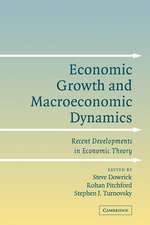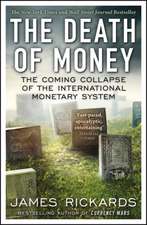Questioning Credible Commitment: Perspectives on the Rise of Financial Capitalism: Macroeconomic Policy Making
Editat de D'Maris Coffman, Adrian Leonard, Larry Nealen Limba Engleză Hardback – 11 sep 2013
Preț: 725.57 lei
Preț vechi: 843.69 lei
-14% Nou
Puncte Express: 1088
Preț estimativ în valută:
138.84€ • 145.32$ • 115.56£
138.84€ • 145.32$ • 115.56£
Carte tipărită la comandă
Livrare economică 31 martie-14 aprilie
Preluare comenzi: 021 569.72.76
Specificații
ISBN-13: 9781107039018
ISBN-10: 1107039010
Pagini: 298
Ilustrații: 29 b/w illus. 21 tables
Dimensiuni: 157 x 284 x 19 mm
Greutate: 0.54 kg
Ediția:New.
Editura: Cambridge University Press
Colecția Cambridge University Press
Seria Macroeconomic Policy Making
Locul publicării:New York, United States
ISBN-10: 1107039010
Pagini: 298
Ilustrații: 29 b/w illus. 21 tables
Dimensiuni: 157 x 284 x 19 mm
Greutate: 0.54 kg
Ediția:New.
Editura: Cambridge University Press
Colecția Cambridge University Press
Seria Macroeconomic Policy Making
Locul publicării:New York, United States
Cuprins
1. Introduction D'Maris Coffman and Larry Neal; 2. Could the crown credibly commit to respecting its charters? England, 1558–1640 Ron Harris; 3. Contingent commitment: the development of English marine insurance in the context of New Institutional Economics, 1577–1720 Adrian Leonard; 4. Credibility, transparency, accountability and the public credit under the Long Parliament and Commonwealth, 1643–53 D'Maris Coffman; 5. Jurisdictional controversy and the credibility of common law Julia Rudolph; 6. The importance of not defaulting: the significance of the election of 1710 James Macdonald; 7. Financing and refinancing the War of the Spanish Succession, then refinancing the South Sea Company Ann M. Carlos, Erin K. Fletcher, Larry Neal and Kirsten Wandschneider; 8. Sovereign debts, political structure, and institutional commitments in Italy, 1350–1700 Luciano Pezzolo; 9. Bounded leviathan: fiscal constraints and financial development in the Early Modern Hispanic world Alejandra Irigoin and Regina Grafe; 10. Court capitalism, illicit markets, and political legitimacy in eighteenth century France: the example of the salt and tobacco monopolies Michael Kwass; 11. Institutions, deficits, and wars: the determinants of British government borrowing costs from the end of the seventeenth century to 1850 Nathan Sussman and Yishay Yafeh; Index.
Recenzii
'Credible commitment is fundamental to finance. This volume of excellent essays by financial historians explores the salient institutional theories about the development of credible commitment. In doing so, it illuminates a watershed period in the emergence of the modern economy.' William N. Goetzmann, Edwin J. Beinecke Professor of Finance and Management Studies, and Director, International Center for Finance, Yale University
'A central thesis in explaining Britain's role as the first industrial nation was its prior financial revolution, assertedly based on the 'credible commitment' of post-Glorious Revolution governments to repay their debts. But no single, salient event - not even the establishment of parliamentary supremacy - could alone explain how relationships of trust emerged between the institutions of the state and private holders of wealth, creating the conditions for first merchant and then industrial capitalists to gain continuing access to liquid capital and the credit required to finance a growing economy. This enthralling collection of first-class scholarship enriches our understanding of the complex, interdependent and highly contingent processes that reached back generations before William of Orange was offered the English throne and extended well into the eighteenth century.' Dr William H. Janeway, CBE, Managing Director and Senior Advisor, Warburg Pincus, and Visiting Scholar, Princeton University
'As the credibility of governments' fiscal policies is put to the test on a daily basis by financial markets, history teaches useful lessons. This highly readable volume puts together a wide range of views - including skeptical ones - on the role of institutional reforms as determinants of variation in the cost of sovereign borrowing.' Paolo Mauro, International Monetary Fund, and co-author of Emerging Markets and Financial Globalization: Sovereign Bond Spreads in 1870–1914 and Today
'A central thesis in explaining Britain's role as the first industrial nation was its prior financial revolution, assertedly based on the 'credible commitment' of post-Glorious Revolution governments to repay their debts. But no single, salient event - not even the establishment of parliamentary supremacy - could alone explain how relationships of trust emerged between the institutions of the state and private holders of wealth, creating the conditions for first merchant and then industrial capitalists to gain continuing access to liquid capital and the credit required to finance a growing economy. This enthralling collection of first-class scholarship enriches our understanding of the complex, interdependent and highly contingent processes that reached back generations before William of Orange was offered the English throne and extended well into the eighteenth century.' Dr William H. Janeway, CBE, Managing Director and Senior Advisor, Warburg Pincus, and Visiting Scholar, Princeton University
'As the credibility of governments' fiscal policies is put to the test on a daily basis by financial markets, history teaches useful lessons. This highly readable volume puts together a wide range of views - including skeptical ones - on the role of institutional reforms as determinants of variation in the cost of sovereign borrowing.' Paolo Mauro, International Monetary Fund, and co-author of Emerging Markets and Financial Globalization: Sovereign Bond Spreads in 1870–1914 and Today
Descriere
An interdisciplinary examination of credible commitment to fiscal responsibility and its relevance to current macroeconomic policy making.






























